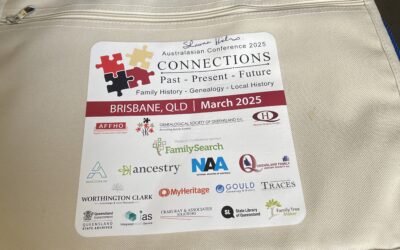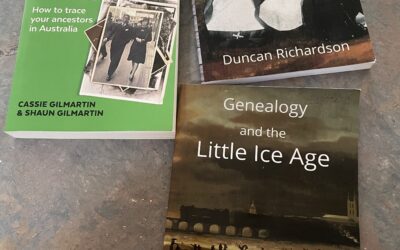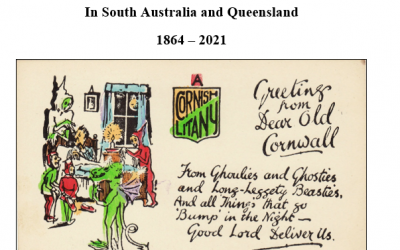This week’s blog is coming from Darwin in the Northern Territory where I have spent a fascinating week. I was also privileged to visit the Library of the Genealogical Society of the Northern Territory (GSNT) where June Tomlinson gave me the tour.
Just because a Society is located in one particular place, does not mean that it only has records for that place. GSNT have a very impressive Library with an extensive collection of resources for just about everywhere and anyone living in the NT and doing family history would be advised to at least pay them a visit and see for themselves. Not everything is on the Internet (which we sometimes forget) and the Library volunteers have a wide range of individual knowledge and experience which they willingly share.
The Society has BDM indexes for all states of Australia and New Zealand. There are many other records on CD, microfiche/microfilm such as cemetery, shipping, post office directories, divorce, convict, school, probates, public servant records, funeral director’s, government gazettes, land, naturalizations etc, which complements the large range of books on all states of Australia and overseas.
If I had brought my own family history research with me, I could quite easily have continued researching here in Darwin. Must remember that next time although sometimes it is a tough choice when so many interesting tourist sites beckon. Over the next few weeks I will be doing a couple of heritage tourism blogs on Unlock the Past based on my travels here in Darwin.
GSNT is conveniently located on the 1st floor at 25 Cavenagh Street in Darwin which is the floor below the Northern Territory Archives Service (NTAS) so you can easily visit both places in a single visit. As NTAS closes for an hour at lunchtime, you can pop downstairs and continue researching on a Tuesday when the Society is open. It is also open on a Saturday afternoon, but NTAS does not open on weekends.
The Society is currently in the process of doing a website upgrade but for the moment, the website gives basic information on the Society, its resources and services. The photographs of the Library give you an idea of the layout and resources available to members and visitors.
For anyone with research in the NT, the Society has acquired or produced a wide range of NT resources. GSNT has been very active in recording information from National Archives of Australia records which were deteriorating and very difficult to read, and in some cases, the records were closed after the Society indexed them. Few burial records were kept of early NT cemeteries, which were usually established as a result of mining activities. Many of these cemeteries have now been indexed by the Society using BDM Indexes, newspaper reports, Coroner’s Inquest, Police Journals etc. There is a very comprehensive and useful listing of cemeteries in the Northern Territory on the website.
The GSNT has been working on a number of projects which will be very useful to anyone with NT research.
- A Pioneer Register which hopes to records all those pioneers who were in the Territory from 1824 to 1939. A lot of previously unrecorded information has been collated through this project and the Society welcomes any further information. Criteria and application form are on the website.
- Northern Territory Police is another project recording biographical information on early police and including where possible a history of the police officer’s career in the NT with a photograph.
- Probates for the Northern Territory have been indexed from 1911 to 1993.
The Society has also published a range of its indexes on microfiche which are available for purchase (see website for details – under Catalogue heading).
- Indexes to the Territory’s first newspaper, the Northern Territory Times and Gazette from 1870 to 1920
- Census records for the Northern Territory for 1881, 1891, 1901
- Shipping information from 1887 to 1921
- Pastoral Lease Applications, Pastoral Permits, Land Transactions
- Men of the Northern Territory
- Police from 1870 to 1914
- Probates from 1911 to 1993
- Index to the Star newspaper from 1976 to 1978
- Cemetery books which cover many NT cemeteries.
The above lists indicate the range and wealth of information on the Northern Territory that is not easily found elsewhere and it is one of the primary reasons you should check out your local genealogy/family history society or the one closest to where your ancestors lived or came from. They will have local resources, usually compiled by volunteers which just might have that missing bit of information you are looking for!





0 Comments